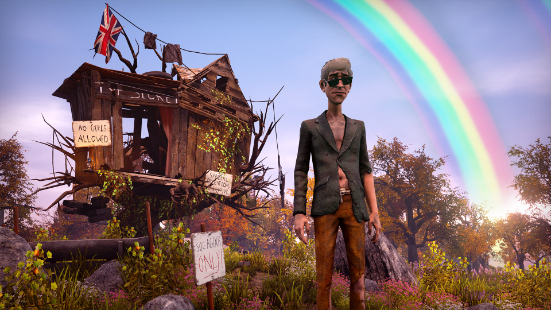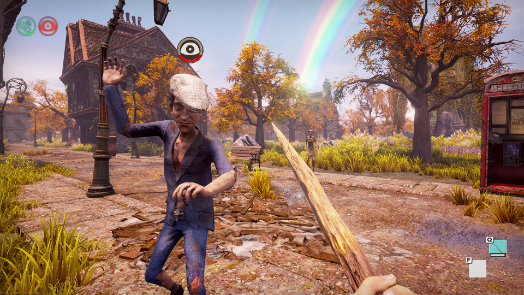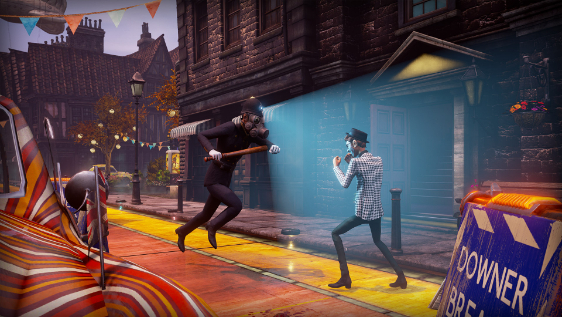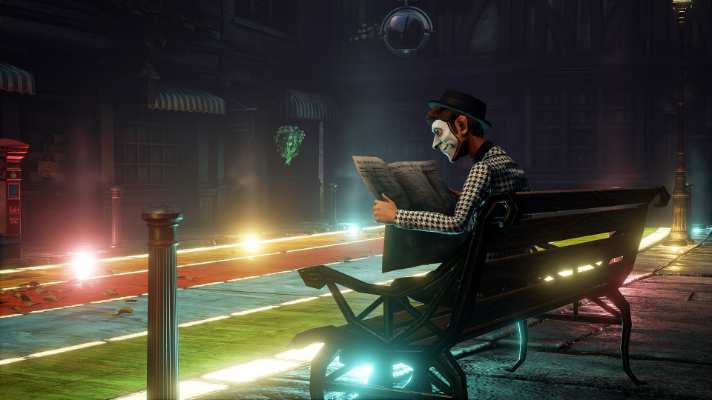“…We Happy Few, at this stage, is intriguing.”
We Happy Few is a dystopian survival thriller set by the developers at Compulsion Games in a uniquely dark and disturbing alternative vision of Great Britain. Set in a world where World War II took quite a different turn in history, the Orwellian-inspired story sees the population of the land living with dulled senses thanks to the enforcement of a compulsory drug named Joy. Joy hides away any negative thoughts in the subjects mind, leaving only a corrupted, hyper-positive shell of a human being behind. Some citizens, however, realise the false truths that their mind tries to show them and attempt to escape the grasp of the mind controlling drugs. These people are dealt with… Forcefully.
The first protagonist we meet in the game, Arthur Hastings, chooses to stop taking his Joy after recalling an old memory during whilst omitting negative stories from old newspapers. As he begins to see the truth of the events transpiring around him, the depth of the authoritarian control in the game unfolds before the players’ eyes. Truly disturbing scenes play out, perhaps most notably one involving a piñata at a birthday party. Or at least the party goers seem to believe it is a piñata anyway… The game manages to express such scenarios in an almost manically sunny light, which only leads to their true darkness feeling all the grimmer.
The Orwellian theming of the game’s setting and story are expressed in the actions of both the upper and the lower classes in the game too. Authorities such a police and other more menacing figures look down on you, with little interest in anything other than following their orders and keeping the lesser civilians in line. Those in the same position as you, however, do not rally to your side either, with a deep mistrust for all of those around them, despite their shared dilemma. As you seek to find your way out of captivity when caught without your Joy then, you have very few allies to rely on, with everyone being a potential threat.
The interactions of characters with yourself compliments the other imagery in the game too. The visual design is best described of gloomy, but still, has too much colour to it for you to ever truly feel comfortable in your surroundings. This almost confusing scenery is as unnerving at the situations which play out in it, as everything around you feels as though it would like you to believe all is well, even though it very clearly isn’t. The sounds of the game, from depressed voices to the turmoil and sickness in the masses, equally fill you with an uneasy sense of dread. The world of We Happy Few is not a pleasant place to be, even if it would like to make you feel in the back of your mind that it might be.
The gameplay in We Happy Few at this stage in its development is a bit hit and miss. At the start of the game, things feel quite comfortable as you simply explore your surroundings. In such an intriguing world, this feels like the ideal way to play. Then as more action-based and survival-based mechanics come in, the dynamic feels a little off. Perhaps when the game opens up the story some more in the (hopefully) near future, these will become more familiar and fitting. At present, the game feels like it would better suit a system like that of Fable or even Dishonoured. This could be largely down to the style and storytelling, but when I played this is what I felt myself craving more than what I was given.
The survival systems which are in place, however, are not inherently bad. The menus for inventory and crafting are clear and easy to get to grips with. Interacting with the world accordingly is also fairly simple, in some places feeling a bit like a Bethesda-styled RPG. The only system I found less pleasant was movement and combat. Getting around and over obstacles does not feel as polished as the games environment does itself. Combat, on the other hand, does not feel like it naturally suits the protagonist early in the game, and as a system, if feels as though it is lacking some part of its substance. Nothing makes it unique to the characters, be they in your control or the games. They just sort of feel like they fight because they do, and that’s that.
The best way to describe We Happy Few, at this stage, is intriguing. Based on story and setting alone, I am totally sold. Some of the actual gameplay needs some work prior to the final release to perfect it, but this is still not an inherently bad feature. The game has a unique feel to it, albeit an uneasy one. This is not meant in a negative way, and if anything it should be seen as a compliment, as the game succeeds in causing you to feel the way that the protagonists must in their world. There is something deeply enticing about this dystopian British adventure which certainly makes you want to explore it more and more. Fix up those few mechanics with a little polish, and We Happy Few definitely has the potential to be something special.














You must be logged in to post a comment.